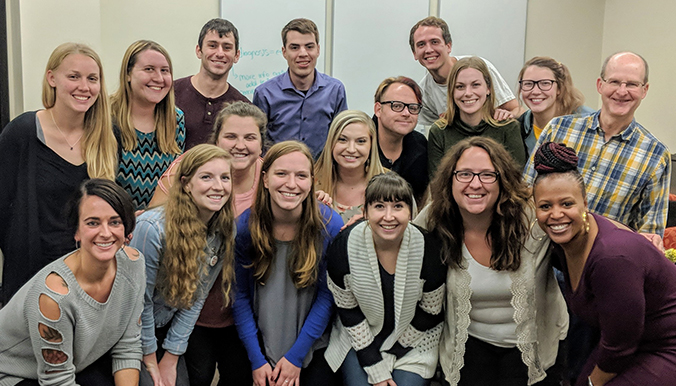Professional Counseling
Clinical Mental Health Emphasis

The Clinical Mental Health Counseling (CMHC) Program is a fully CACREP-accredited counseling program. This 60-credit hour program aligns with accreditation standards and the contemporary direction of the counseling profession. Clinical Mental Health counselors are afforded several opportunities to develop their clinical counseling and conceptualization skills throughout their training. This includes a focus on theory, diagnosis and treatment, neuroscience, crisis and trauma, family systems, and addiction. Clinical mental health counselors will work with a variety of populations and may work in a variety of settings as well. As such, we work to prepare counselors to be ready to work in a diverse world, along the developmental spectrum.
Students who are interested in taking Professional Counseling courses, but are not enrolled in the program, may contact us. If you are not currently a graduate student at UWO, faculty will refer you to the Application for Special Students. Once submitted, they will meet to decide about your request to take courses without full admission.
The UWO counseling program helped me learn so much about who I am as a person and gain the confidence and skills to believe in myself. As a Psychological Associate at the Wisconsin Resource Center, I provide individual and group counseling working to improve the climate among my clients on my unit. I have found this work to provide me with purpose and meaning.
POINTS OF PRIDE
Our program has a strong focus on social justice, multicultural competency, advocacy, wellness, mindfulness, and spirituality. Students are encouraged to develop their interests for specific settings and populations. Clinical Mental Health counselors will have the opportunity to work in a variety of settings, including, but not limited to, psychiatric hospitals, community clinical mental health agencies, private practices, and group practices.
Within these settings, counselors may generalize their practice or become more specialized with a particular population or problem area.
PROGRAM FEATURES
Our program promotes experiential learning, helping students learn to apply what they are reading and experiencing in the classroom. Students will take six skills courses and eight core courses. These experiences offer an ever-increasing level of skill building that culminates in a two-semester internship in the field.
- Counseling Process
- Group Counseling Process
- Theoretical Foundations in Counseling,
- Practicum, Internship I and Internship II
Planning Sheets
The below planning sheets provides an overview of classes offered during each semester of the 60-hour program. Program Plans of Study are subject to change relative to department, accreditation, or the College of Education and Human Services or the Graduate Studies office.
It is therefore strongly recommended that students work closely with their advisors throughout the completion of their emphasis program.
GRADUATION TO LICENSURE
Once students graduate from the CMHC program, they can apply for a training license through the Department of Safety and Professional Services (DSPS), our state licensing department.
Counselors will become fully licensed after 3,000 hours of supervised practice in the field. Additionally, students may begin getting involved in professional organizations throughout their training, such as the Wisconsin Counselor Association, the American Counseling Association, or our honor society, Chi Sigma Iota.
Professional Counseling Licensure Application
The following resource is the most up to date information regarding how to navigate the process of applying for both the In-Training License and Professional Counselor License.
